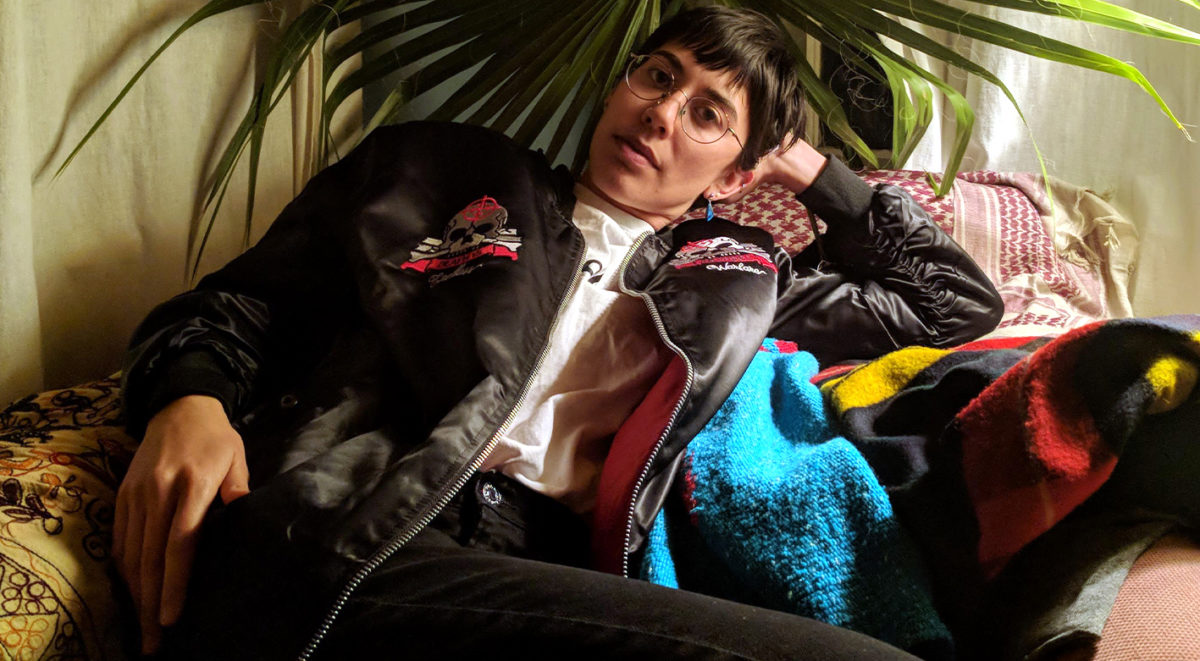
“Carving it out sister (peace-sign emoji)” is, fittingly, a roller coaster ride and a half. The language weaves seamlessly between high and low, pausing to linger on an image, and then taking off at breakneck speed again. It’s a poem that benefits from multiple readings, allowing different aspects to jump forward on different occasions.
In this interview, Poetry Editor Emily Chou asks J some questions about their approach to craft, the identity of vampira, and where the best amusement park can be found.
Order your own copy of VULGAR here to read “Carving it out sister (peace-sign emoji)” and much more!
Who have you been reading lately, or turning to for inspiration?
My response comes from where I’m situated, in the U.S., as communities here are labouring to make space to grieve collectively and resist the affronts to the psychic, spiritual, and physical wellbeing—the murders—of Black, Latinx, and First Nations people, as well as other People of Colour. White supremacy and toxic patriarchal values are clinging to power with a death grip, as is appropriate for the death cults those systems represent. So right now, for grounding, solace, and fire, I’m turning to Audre Lorde’s raw 1981 keynote speech “The Uses of Anger: Women Responding to Racism,” as well as the work of international feminists and transfeminists such as Nat Raha, Nisha Ramayya, Dr. Margo Okazawa-Rey, bell hooks, and poet Mei-Mei Berssenbrugge. Listening to Mondo Grosso and Wesley Willis also uplifts and inspires me!
“Carving it out, sister (peace-sign emoji)” was originally submitted in a batch called “Vampira poems”. Can you tell me a little bit more about this idea/character of vampira and your relationship with them?
I’ll begin by saying that both beyond and within the original suite of poems I sent to PRISM, vampira is a very real individual, my amazing sister-cousin, and “vampira” is also their porous experimental performance and conceptual field which appears in changing form on Instagram. The three original poems I submitted were culled from a larger body of writing I’m working on in which “vampira” interrupts the scene—their sudden appearance in the poems, for me, is a performative utterance, opening channels of yearning and pivoting the readerly address hopefully into a third space, where reader, speaker, and a third beloved become tangled and blurred. vampira’s complex formations and creations-and-destructions of a self (on and off Instagram) called me to consider and write into themes of diasporic queer* identity and kinship while navigating the devastations of capitalism in daily life.
This poem makes very contemporary references, both in its imagery and its language, yet somehow simultaneously feels timeless. It moves at breakneck speed, yet feels suspended in an eternal moment. Every single choice in this poem is so intentional and expertly balances conflict and contrast. Can you share a little about the generative and editing process of this piece?
Wow, I’m both humbled and made nervous by your insight and kind words about this poem. For about two years now, I’ve been involved in a writing group organized by my friend hannah rubin called Twenty Lines, in which you’re encouraged to send twenty lines of new writing everyday to your partner-of-the-week. I wrote an early iteration of this poem as a Twenty Lines “assignment” while resting on a bench at a theme park last summer. Another friend was napping in a bush behind me. “Carving it out, sister (peace-sign emoji)” finds its energy and sense of electric suspension from the spirit of a Twenty Lines practice, which holds space for wholeness in the “incomplete” gesture, for presence in the interstitial. The poem itself is curious about floating attention, and sloppy, haptic, sparkly queer excess, and maybe struggles through ekphrasis to explore the feeling of the interstitial––its interruptions.
In These Unprecedented Times, what have you discovered about your artistic practice?
Retreating from an arts practice is also part of the practice.
What’s the best carnival/amusement park you’ve visited?
A friend and I were wandering around London one night a few winters ago, and we walked into a German-Swiss Alps carnival in Hyde Park. The rides were all snow and beer and reindeer-themed, and the machine attendants were wearing lederhosen and smoking cigarettes. The space was both very brightly lit by flood lamps and full of mysterious shadows cast by the rides. My friend and I shared a pint or two, ate pretzels, and rode a few wobbly mini roller coasters. There was even a little winter-themed market, full of hand-painted ceramics and thimbles. It was absolutely weird, wonderful, and surreal.
J/Jhani Randhawa is an interdisciplinary artist and editor whose work reckons with disorientation, embodiment, queer* phenomenologies, environmental justice, diaspora and displacement, and salvage—filtered through an ecofeminist lens. J’s writing and performance have appeared, or are forthcoming, in outlets such as DoubleBlind, LA VAGUE, baest, TAGVVERK, goodGRIEF zine, El Cid in Los Angeles, The Mortuary, and the Woolen Mill Gallery of the Wormfarm Institute, where they were an artist-in-residence in 2019. In July 2020, J’s poetry collection Time Regime was longlisted for Radix Media’s Own Voices Chapbook Prize. They currently co-edit rivulet, an experimental arts and print project, with Teo Rivera-Dundas.